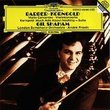| All Artists: Johannes Brahms, Robert Schumann, Herbert von Karajan, Berlin Philharmonic Orchestra Title: Brahms, Schumann: Symphony No. 1 / Karajan, Berlin Philharmonic Orchestra Members Wishing: 0 Total Copies: 0 Label: Deutsche Grammophon Release Date: 2/13/1996 Genre: Classical Styles: Forms & Genres, Symphonies, Historical Periods, Modern, 20th, & 21st Century, Symphonies Number of Discs: 1 SwapaCD Credits: 1 UPC: 028944740820 |
Search - Johannes Brahms, Robert Schumann, Herbert von Karajan :: Brahms, Schumann: Symphony No. 1 / Karajan, Berlin Philharmonic Orchestra
 | Johannes Brahms, Robert Schumann, Herbert von Karajan Brahms, Schumann: Symphony No. 1 / Karajan, Berlin Philharmonic Orchestra Genre: Classical
|
Larger Image |
CD DetailsSimilarly Requested CDs
|
Member CD ReviewsReviewed on 8/20/2006... Deutsche Grammaphon. ADD. 76 minutes.
CD ReviewsThoroughly enjoyable Derek Lee | St. Paul, MN USA | 12/13/2005 (5 out of 5 stars) "First, I would like to say a few words in case Mr. Hurwitz is by chance reading this. Hasty, extreme words clothed as professional review do no one justice. Clearly he hates these performances, even refering to the Schumann as possibly the worst in history. Really, can't everyone here think of performances that are vastly inferior to these? Every reviewer should distrust both excessive praise and derision, prefering instead a more objective approach, simply listing the positives and negatives and allowing the reader to make of it what he will (I feel the reviewer should assume the reader to be more intelligent than they themselves are). I cannot pretend to be perfectly objective; certainly I have all the faults I've stated, as does every human being, but let me make an attempt here. Certainly this music is played with great passion and sincerity. Although in the Brahms Karajan is much more restrained than Furtwangler in his use of tempo modulation, he taps into the same atmosphere, very dark, introspective, with every gesture full of meaning. The interpretation of the Schumann is by contrast extroverted and intense, especially for the supposedly "cold" Karajan. To both the Berliners give their deep, rich sound that is unique and instantly identifiable (it's hard to believe there was a time when you could tell the great orchestras apart). On this line and as a side note, I don't really understand Mr. Hurwitz's comments about the winds being inaudible. I was able to hear them very clearly, and I have perfectly ordinary hearing. To sum up, both are beautiful, passionate, and for me very satisfactory. Thoroughly recommended." Not as bad as Hurwitz makes out Tom Gauterin | Loughborough, Leics. United Kingdom | 08/02/1999 (4 out of 5 stars) "The only thing Hurwitz has got right in the review above is that the Brahms performance is better than the Schumann. It would seem that he has let his obvious anti-Karajan bias(see some of his other reviews!) get the better of him here and, given that the Brahms is perhaps one of the best accounts of the symphony to have appeared, this bias should not dissuade potential buyers. The Gramophone review is far closer to the mark on this occasion. The Berlin Philharmonic under Karajan became noted for the smoothness of its playing,not always ideal,but in the Brahms, this approach works extremely well. Brahm's symphonies are remarkable for the way in which the germ of an idea is allowed to expand and, in this recording, the Berlin Philharmonic's playing complements the smoothness of Brahms's thematic development. The booklet notes draw attention to the way in which the various instruments blend to perfection within ensemble sections but can still sound suitably individual when necessary. This, really, all makes this disc very recommendable simply on accout of the Brahms and, while Karajan (of whom I am not an ardent fan) did have an irritating habit of recording 'standard' German repertoire several times(4 Beethoven cycles, 3 Brahms), he did get it right sometimes. This Brahms recording is one such example. As Hurwitz notes, the Schumann is less successful. Although this is far from being high on the list of recommended recordings, however, it still is not as bad as Hurwitz makes out. It is simply the kind of performance that one would expect from a large, modern symphony orchestra and, as a result, the textures do sound pretty stodgy in places. If you want to hear Schumann in the best way, try John Eliot Gardiner's recent cycle on Archiv. For this, he significantly reduced the number of players he used, particularly in the string sections, with the result that Schumann's frequently criticised orchestration was shown not to be inept, but simply unsuited to the modern orchestra. if you must have modern instruments, Christoph von Dohnanyi's set on a Double Decca is more than satisfactory. Despite the problems of a modern orchestra and the rather deliberate tempi which Karajan adopts, the Berliners still manage to convey the delicate shifts in Schumann's orchestral colouring but this still doesn't improve the Schumann very much. Really, this recording demonstrates the problems of playing Schumann with a modern orchestra rather than any particular ineptitude on Karajan's part. This CD is undeniably worth buying just for the Brahms and, rather than yet another Tragic Overture or Haydn Variations to fill it up, the Schumann is a useful pointer to the difficulties that Schumann presents."
|

 Track Listings (8) - Disc #1
Track Listings (8) - Disc #1


![The Very Best of the Platters [Mercury]](https://nationalbookswap.com/cd//m/61/5361/15361.jpg)





